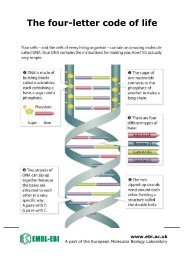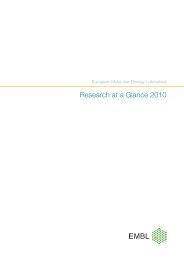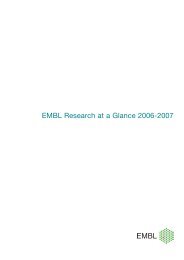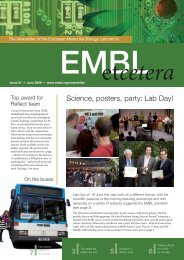Create successful ePaper yourself
Turn your PDF publications into a flip-book with our unique Google optimized e-Paper software.
<strong>EMBL</strong>-EBI, Hinxton, UK<br />
The European Bioinformatics Institute (<strong>EMBL</strong>-EBI) lies in the 55 acres of landscaped parkland in rural Cambridgeshire that<br />
make up the Wellcome Trust Genome Campus, which also houses the Wellcome Trust Sanger Institute. Together, these institutes<br />
provide one of the world’s largest concentrations of expertise in genomics and bioinformatics. <strong>EMBL</strong>-EBI has a fourfold mission:<br />
• to provide freely available data and bioinformatics services to all facets of the scientific community in ways that promote<br />
scientific progress;<br />
• to contribute to the advancement of biology through basic investigator-driven research in bioinformatics;<br />
• to provide advanced bioinformatics training to scientists at all levels, from PhD students to independent investigators;<br />
• to help disseminate cutting-edge technologies to industry.<br />
As a hub of bioinformatics in Europe, <strong>EMBL</strong>-EBI provides data resources in all the major molecular domains and grew out of<br />
<strong>EMBL</strong>’s pioneering work in providing public biological databases to the research community. Its comprehensive range of data resources<br />
includes the European Nucleotide Archive (DNA and RNA sequences); Ensembl (genomes); ArrayExpress (transcriptomics<br />
and gene expression data); UniProt (protein sequences and functional information); PDBe (protein structures); InterPro<br />
(protein families, motifs and domains); IntAct (molecular interactions); and Reactome (pathways). All of these resources are the<br />
products of international collaborations with other data providers. As the coordinator of ELIXIR, an EU-funded project to agree<br />
upon the future bioinformatics infrastructure for Europe, we are working with scientists and funders throughout Europe to pave<br />
the way towards a more stable footing for Europe’s core data resources.<br />
We have a broad palette of research interests that complement our data resources and these two strands of activity are mutually<br />
supportive, with many collaborations between research groups and service teams. Eight research groups aim to understand biology<br />
through the development of new approaches to interpreting biological data. These diverse approaches include classifying<br />
and understanding proteins and their interactions; mathematical analyses of evolutionary models; computational modelling of<br />
neuronal signalling; text mining; statistical approaches to functional genomics; large-scale analysis of regulatory systems and differentiation<br />
and RNA genomics. In addition, our services teams perform extensive research to enhance existing data resources<br />
and develop new ones.<br />
The EBI also provides user training, both on-site, through its hands-on training programme, and off-site through the Bioinformatics<br />
Roadshow. More information is available at www.ebi.ac.uk/training.<br />
Almost all of our groups offer PhD places through the <strong>EMBL</strong> International PhD Programme. <strong>EMBL</strong>-EBI’s PhD students register<br />
with, and obtain their doctorates from, the University of Cambridge. For a list of those groups with PhD places available for<br />
2010/2011, please see the PhD studies section of our training web pages: www.ebi.ac.uk/training/Studentships. Other positions<br />
are advertised through the <strong>EMBL</strong> jobs pages (www.embl.org/jobs).<br />
Janet Thornton<br />
Director, <strong>EMBL</strong>-EBI













